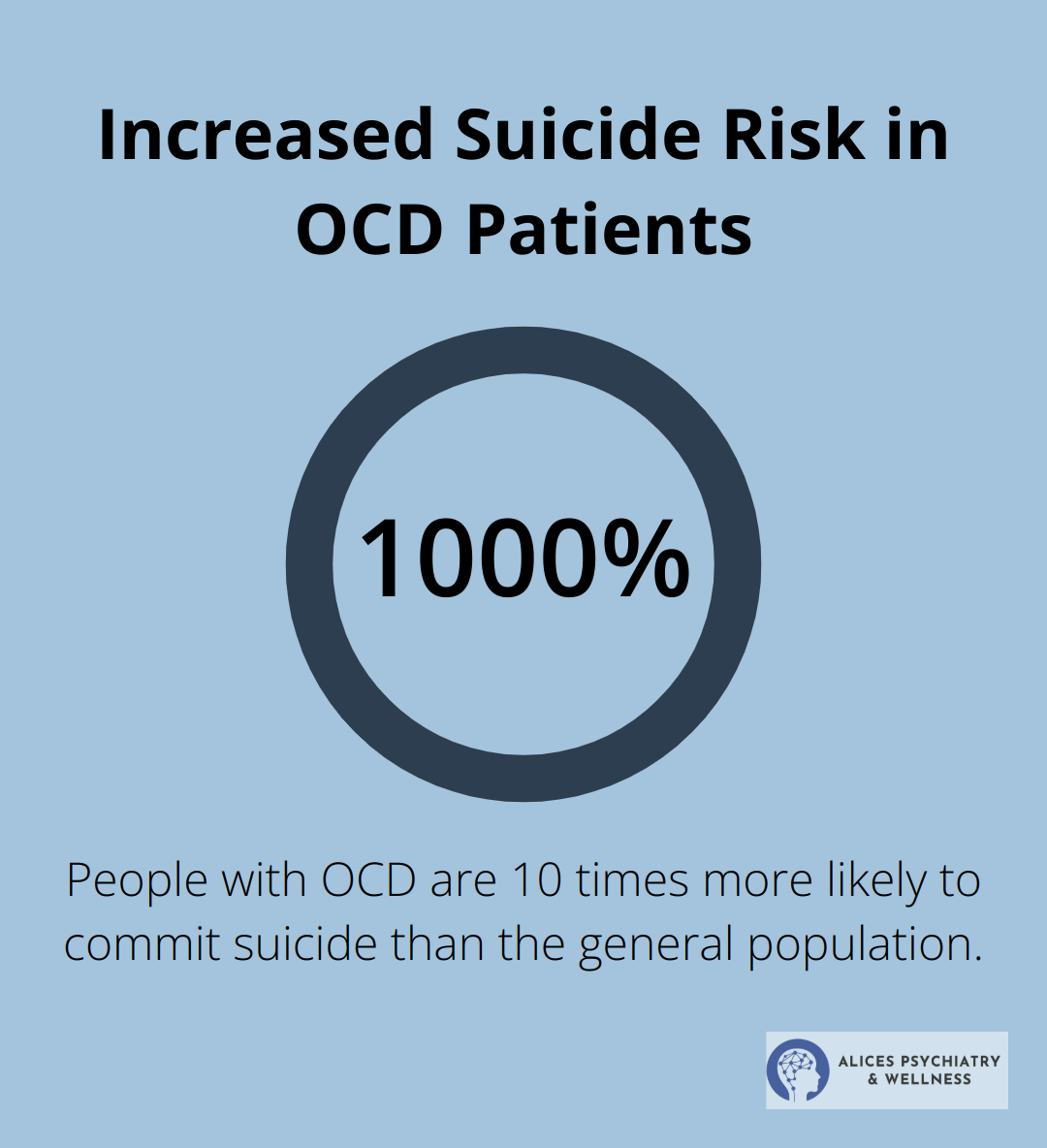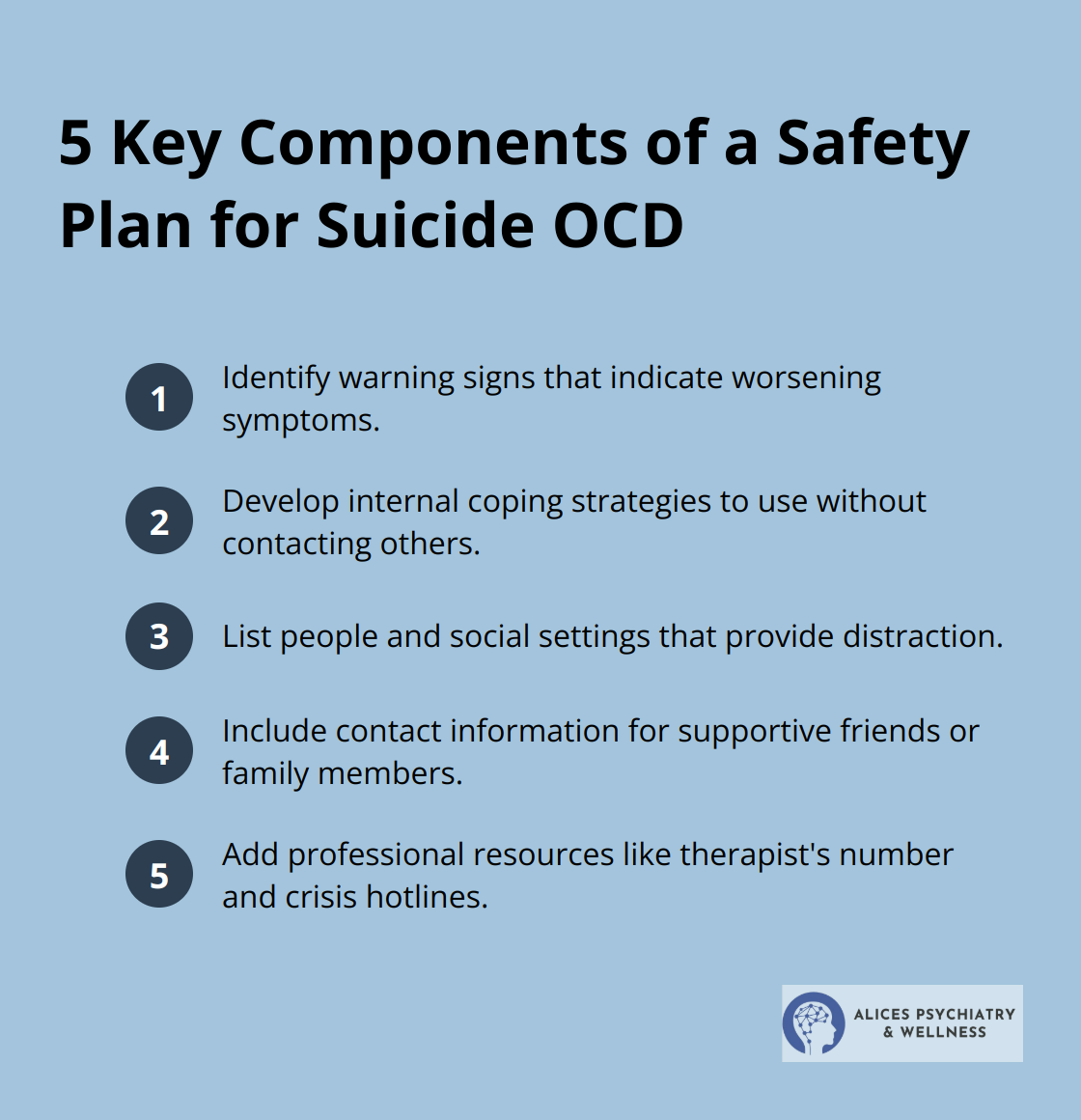Suicide OCD is a distressing form of obsessive-compulsive disorder that can leave individuals feeling overwhelmed and isolated. At Alice’s Psychiatry and Wellness, we understand the unique challenges this condition presents.
This blog post explores effective coping strategies and support systems for those grappling with Suicide OCD. We’ll provide practical tools and resources to help you navigate this difficult journey and find hope for recovery.
Understanding Suicide OCD: A Comprehensive Overview
Definition and Characteristics of Suicide OCD
Suicide OCD is a subtype of Obsessive-Compulsive Disorder that involves unwanted, intrusive thoughts about suicide or self-harm. These thoughts cause significant distress, but individuals with this condition do not actually want to end their lives. It’s essential to recognize that these thoughts are symptoms of the disorder, not genuine desires for self-harm.
Common Intrusive Thoughts in Suicide OCD
Individuals with Suicide OCD may experience a range of distressing thoughts, including:
- Vivid images of self-harm or suicide
- Fears of losing control and acting on suicidal thoughts
- Worries about being secretly suicidal without realizing it
- Obsessive thoughts about the methods or consequences of suicide
These thoughts often lead to compulsive behaviors (such as seeking reassurance or avoiding triggers) to neutralize the anxiety they cause.
Distinguishing Suicide OCD from Suicidal Ideation
A key difference between Suicide OCD and genuine suicidal ideation lies in the individual’s reaction to these thoughts. Those with Suicide OCD find their thoughts extremely distressing and actively try to avoid or neutralize them. In contrast, individuals with genuine suicidal ideation may view suicide as a solution to their problems.
Research suggests that people with OCD may be 10 times more likely to commit suicide than the general population.

Treatment Approaches for Suicide OCD
Effective treatment for Suicide OCD typically involves a combination of therapy and, in some cases, medication. Cognitive Behavioral Therapy (CBT) with a focus on Exposure and Response Prevention (ERP) has shown particularly promising results.
Many mental health clinics (including Alice’s Psychiatry and Wellness) offer personalized treatment plans that may include these evidence-based approaches. Experienced mental health professionals work closely with each patient to develop a tailored strategy for managing Suicide OCD symptoms.
The Importance of Seeking Help
Seeking help for Suicide OCD is vital. Many individuals delay treatment due to fear or shame, but early intervention can significantly improve outcomes. If you experience symptoms of Suicide OCD, don’t hesitate to reach out to a mental health professional for support and guidance.
In the next section, we’ll explore specific coping strategies that can help individuals manage Suicide OCD symptoms and improve their quality of life.
Effective Strategies for Managing Suicide OCD
Cognitive Behavioral Therapy (CBT)
CBT stands as a cornerstone in treating Suicide OCD. This therapy helps individuals identify and challenge distorted thought patterns. Cognitive Behavioral Therapy (CBT) has been shown to be effective in improving OCD symptoms, particularly when combined with medication such as paroxetine.

One practical CBT technique is cognitive restructuring. This involves identifying negative thoughts (e.g., “I will lose control and hurt myself”) and replacing them with more realistic ones (e.g., “These are just thoughts, not actions. I have never acted on them before”).
Mindfulness and Acceptance
Mindfulness practices serve as powerful tools for managing Suicide OCD. The goal is not to eliminate intrusive thoughts but to change your relationship with them.
One effective mindfulness exercise is the “leaves on a stream” visualization. Imagine your thoughts as leaves floating down a stream. Observe them without judgment, letting them pass by. This helps create distance from intrusive thoughts without engaging with them.
Exposure and Response Prevention (ERP)
ERP is a specific form of therapy that’s highly effective for OCD. It involves gradual exposure to feared situations or thoughts while preventing the usual compulsive responses.
In ERP for Suicide OCD, you might start by writing out your intrusive thoughts, then progress to saying them out loud, all while resisting the urge to perform compulsions. It’s important to work with a trained therapist for this approach.
Medication Management
Medication can play a vital role in managing Suicide OCD. Selective Serotonin Reuptake Inhibitors (SSRIs) are often prescribed.
However, medication isn’t a one-size-fits-all solution. Some mental health clinics (like Alice’s Psychiatry and Wellness) offer pharmacogenetic testing to help determine the most effective medication for each individual based on their genetic makeup.
Lifestyle Changes
Incorporating lifestyle changes can complement therapeutic approaches. Regular exercise, a balanced diet, and adequate sleep can significantly impact mental health.
Managing Suicide OCD requires a multi-faceted approach. These strategies, combined with professional support, can significantly improve your quality of life. In the next section, we’ll explore how to build a strong support system to complement these coping strategies.
Building Your Support Network for Suicide OCD
The Importance of Professional Help
Professional help forms the foundation of managing Suicide OCD. Mental health professionals offer specialized knowledge and evidence-based treatments. They provide a safe space to discuss your thoughts without judgment and develop tailored coping strategies.
When you choose a mental health provider, look for someone with experience in treating OCD, particularly Suicide OCD. Many clinics offer initial consultations to help you find the right fit. Ask about their approach to treating Suicide OCD and their success rates with similar cases.
Communicating with Loved Ones
Opening up to family and friends about Suicide OCD can be challenging, but it’s an essential step in building your support network. Start by choosing one or two trusted individuals to confide in. Explain that your thoughts are symptoms of OCD, not genuine desires for self-harm. Provide them with resources about Suicide OCD to help them understand your experience better.
Be specific about how they can support you. This might include listening without judgment, helping you stick to your treatment plan, or spending time with you during difficult moments. It’s okay to set boundaries and let them know when you need space.
The Power of Support Groups
Support groups offer a unique opportunity to connect with others who understand your experiences firsthand. Try to find local OCD support groups in your area or consider online communities. Some websites offer forums and virtual support groups. These platforms allow you to share your experiences, learn from others, and feel less isolated in your struggle.
Developing a Safety Plan
A safety plan is a personalized, practical guide that you can turn to if you experience intense OCD symptoms or suicidal thoughts. Work with your therapist to create this plan. It should include:
- Warning signs that indicate your symptoms are worsening
- Internal coping strategies you can use without contacting another person
- People and social settings that provide distraction
- Contact information for friends or family members who can help
- Professional resources (including your therapist’s number and local crisis hotlines)

Keep your safety plan easily accessible, perhaps saved on your phone or written in a notebook you carry with you.
Utilizing Online Resources
The internet offers a wealth of resources for individuals dealing with Suicide OCD. Many reputable organizations provide educational materials, self-help tools, and online support forums. These resources can supplement your treatment and provide additional support between therapy sessions.
Final Thoughts
Suicide OCD presents significant challenges, but effective management and recovery are possible. Professional help, evidence-based therapies, and a strong support network empower individuals to cope with intrusive thoughts and regain control. Cognitive Behavioral Therapy, Exposure and Response Prevention, mindfulness practices, and medication management (when appropriate) can significantly reduce symptoms of Suicide OCD.
A robust support system includes professional help, open communication with trusted loved ones, and participation in support groups. Creating a safety plan provides a practical tool for managing difficult moments and ensures readily available resources. Many individuals have successfully managed their symptoms and now lead fulfilling lives.
If you struggle with Suicide OCD, don’t hesitate to reach out for help. At Alice’s Psychiatry and Wellness, we offer personalized treatment plans to support your journey to mental wellness. Our experienced team understands the unique challenges of Suicide OCD and provides the support and resources you need to thrive.





